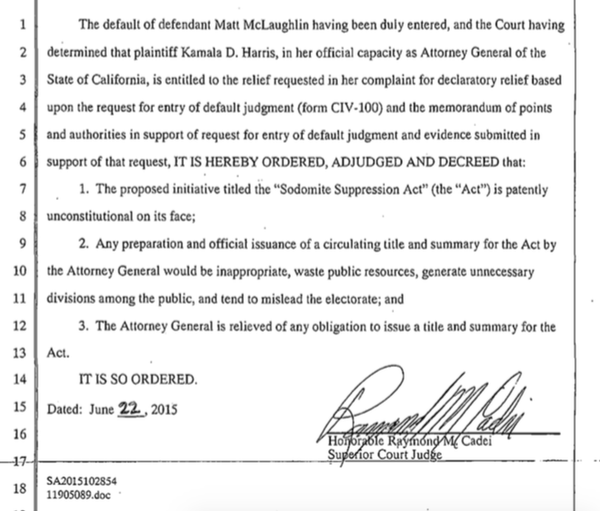Sodomite Suppression Act shut down by CA Superior Court
by Josephine Djuhana | June 24, 2015 10:52 am
On Tuesday, Sacramento County Superior Court Judge Raymond M. Cadei ruled to prevent the Sodomite Suppression Act from moving forward in the initiative process. State Attorney General Kamala Harris, who first filed an action for declaratory relief, is no longer obligated to issue a title and summary for the act.
As Judge Cadei wrote in his one-page ruling, the Sodomite Suppression Act – also known as the “Shoot The Gays Initiative” – is “patently unconstitutional on its face,” and any further filing action “would be inappropriate, waste public resources, generate unnecessary divisions among the public, and tend to mislead the electorate.”
 [1]
[1]
Regarding the ruling, Human Rights Campaign President Chad Griffin said in a press release:
“Lest there was any doubt, a heinous California ballot initiative seeking to put gay people to death has been found unconstitutional. HRC thanks Attorney General Kamala Harris for her continued leadership in standing up for the rights and dignity of LGBT Californians, and Superior Court Judge Raymond Cadei for recognizing that this barbaric initiative has no place on a ballot in California or anywhere else.”
The act was initially filed[2] in February by Orange County attorney Matt McLaughlin, and called sodomy an “abominable crime against nature” and “a monstrous evil.” McLaughlin proposed gay and lesbian “offenders” should “be put to death by bullets to the head or by any other convenient method.”
 [3]
[3]Tori Rector/flickr
In March, Attorney General Harris requested the state Superior Court to relieve her from the responsibility of creating a title and summary for the initiative. “This proposal not only threatens public safety, it is patently unconstitutional, utterly reprehensible, and has no place in a civil society,” she said[4] in a prepared statement. “If the court does not grant this relief, my office will be forced to issue a title and summary for a proposal that seeks to legalize discrimination and vigilantism.”
Since the filing, two larger issues have worked themselves into the discussion of reforming the state ballot initiative process.
First, because it costs $200 to submit an initiative and begin the process of gathering 365,880 signatures to get the measure on the ballot, some believe the fee should be raised in order to prevent abuse of the system.
Assemblyman Evan Low, D-Campbell, said[5] in a release, “While the court’s ruling on this egregious initiative proposal is both legally and morally the right action to take, the events bring attention to the need to reform the initiative process.” He and Assemblyman Richard Bloom, D-Santa Monica, introduced[6] Assembly Bill 1100, which would increase the filing fee from $200 to $8,000. The legislation since then has been amended to increase the fee to $2,500, but critics worry a higher fee would prevent legitimate grass-roots petitioners from gaining traction without the help of well-off backers.
Second, some advocate[7] that the state attorney general should be given the power “to kill a proposal that would conflict with superseding law” – such as murder. Technically, any proposed initiative must be given a title and summary by the state attorney general, but some say the AG should have the authority to turn down the numerous long-shot and outright offensive measures that have come up throughout the years.
However, this kind of power could enable elected partisan officials to filter out all the measures that go against their own political agendas. Kim Alexander, president of the California Voter Foundation, told[8] NPR that the initiative process must “be kept at arm’s length from the Legislature and the politicians who frequently want to usurp its power.”
- [Image]: http://calwatchdog.com/wp-content/uploads/2015/06/ruling.png
- filed: https://oag.ca.gov/system/files/initiatives/pdfs/15-0008%20(Sodomy)_0.pdf
- [Image]: http://calwatchdog.com/wp-content/uploads/2015/06/gavel-justice.jpg
- said: https://oag.ca.gov/news/press-releases/attorney-general-kamala-d-harris-issues-statement-proposed-ballot-initiative
- said: http://asmdc.org/members/a28/news-room/press-releases/assemblymember-low-responds-to-court-s-ruling-on-initiative-proposal
- introduced: http://leginfo.legislature.ca.gov/faces/billNavClient.xhtml?bill_id=201520160AB1100
- advocate: http://www.npr.org/sections/itsallpolitics/2015/03/24/395070728/calif-lawyer-proposes-ballot-initiative-to-kills-gays-and-lesbians
- told: http://www.npr.org/sections/itsallpolitics/2015/03/24/395070728/calif-lawyer-proposes-ballot-initiative-to-kills-gays-and-lesbians
Source URL: https://calwatchdog.com/2015/06/24/sodomite-suppression-act-shut-down-by-ca-superior-court/